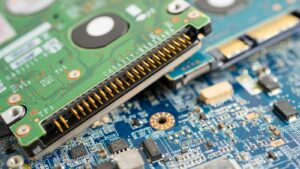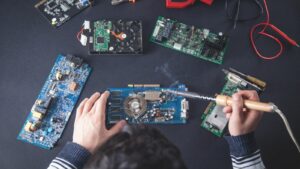Key Takeaways
- Role Overview: Computer hardware engineers design, develop, and test computer systems and components, playing a vital role in modern technology advancements.
- Key Responsibilities: Their work involves creating hardware specifications, developing prototypes, testing for performance, troubleshooting issues, and collaborating with software teams.
- Essential Skills: A strong educational background in electrical or computer engineering, proficiency in CAD software, knowledge of circuit design, and programming skills are crucial for success in this field.
- Work Environment: Engineers often work in diverse settings, collaborating in multidisciplinary teams, with increasing opportunities for remote work to enhance work-life balance.
- Career Outlook: The demand for computer hardware engineers is expected to grow, driven by technological advancements, consumer electronics trends, and evolving industry needs, presenting promising career opportunities.
In today’s tech-driven world, computer hardware engineers play a crucial role in shaping the devices that power our lives. These professionals design, develop, and test computer systems and components, ensuring they meet the ever-evolving demands of technology. From creating circuit boards to optimizing processors, their work forms the backbone of modern computing.
As the demand for advanced technology continues to grow, understanding the job description of a computer hardware engineer becomes essential for aspiring professionals and employers alike. This article delves into the key responsibilities, required skills, and potential career paths within this dynamic field, providing valuable insights for anyone interested in pursuing a career in computer hardware engineering.
Computer Hardware Engineer Job Description
 A computer hardware engineer designs, develops, and tests computer systems and components. This role involves working with both hardware, like circuit boards and processors, and software, such as operating systems and drivers. Responsibilities include analyzing project requirements, creating detailed specifications, and overseeing manufacturing and installation processes.
A computer hardware engineer designs, develops, and tests computer systems and components. This role involves working with both hardware, like circuit boards and processors, and software, such as operating systems and drivers. Responsibilities include analyzing project requirements, creating detailed specifications, and overseeing manufacturing and installation processes.
Key tasks include:
- Designing computer hardware, like motherboards and processors, for optimal performance
- Developing prototypes to evaluate designs and functionality
- Testing products for durability and efficiency through real-world simulations
- Troubleshooting hardware issues and providing solutions
- Collaborating with software engineers to ensure seamless integration of hardware and software components
Essential skills encompass proficiency in hardware design programs, strong analytical capabilities, and knowledge of manufacturing processes. A bachelor’s degree in electrical engineering or computer engineering often serves as the educational foundation for this profession.
Career paths may lead to roles in various sectors, such as telecommunications, aerospace, and computer manufacturing, reflecting the diverse applications of computer hardware engineering.
Key Responsibilities
Computer hardware engineers play a crucial role in developing advanced computer systems and components. Their responsibilities encompass various critical tasks that ensure efficiency, functionality, and reliability in hardware design and implementation.
Design and Development
Designing hardware involves creating specifications for components like circuit boards and processors. Engineers utilize Computer-Aided Design (CAD) software to draft layouts and schematics. They develop prototypes and iterate designs based on testing results, ensuring optimal performance in alignment with technological trends. Engineers also collaborate with cross-functional teams to meet project deadlines and integrate hardware with software systems seamlessly.
Testing and Implementation
Testing ensures that hardware meets quality and performance standards. Engineers conduct rigorous tests to evaluate durability, efficiency, and compatibility with existing systems. They troubleshoot issues that arise during testing phases, making necessary adjustments to enhance product reliability. Upon successful testing, implementation involves overseeing the production process and coordinating with manufacturing personnel to ensure adherence to design specifications.
Required Skills and Qualifications
Computer hardware engineers require a blend of education, technical skills, and soft skills to excel in their roles. These competencies facilitate their ability to create and optimize complex systems efficiently.
Education Requirements
A bachelor’s degree in electrical engineering, computer engineering, or a related field serves as the foundational credential for computer hardware engineers. Advanced degrees, such as a master’s in engineering, enhance knowledge and career prospects, particularly in specialized areas like integrated circuit design or computer architecture. Relevant certifications in hardware design or project management can additionally improve qualifications.
Technical Skills
Computer hardware engineers need several technical skills, including:
- Proficiency in CAD Software: Familiarity with tools like AutoCAD or SolidWorks aids in designing hardware components.
- Understanding of Circuit Design: Expertise in analog and digital circuit design is crucial for developing effective hardware solutions.
- Knowledge of Microprocessors and Microcontrollers: Familiarity with various processors enhances design accuracy and functionality.
- Experience with Testing Equipment: Utilizing oscilloscopes and multimeters helps engineers evaluate hardware performance and troubleshoot issues.
- Programming Skills: Competence in languages such as C or VHDL facilitates effective communication with software engineering teams, paving the way for successful system integration.
These skills equip engineers to overcome challenges in design, development, and testing while ensuring technological advancements continue to flourish.
Work Environment
Computer hardware engineers typically work in various settings, ranging from corporate offices to manufacturing facilities. Their environment reflects the multifaceted nature of their responsibilities, often requiring collaboration with other professionals.
Collaboration and Teamwork
 Collaboration and teamwork are crucial aspects of a computer hardware engineer’s work environment. Engineers frequently engage in multidisciplinary teams that include software developers, project managers, and quality assurance experts. These interactions promote effective communication, allowing engineers to align hardware designs with software requirements. Regular meetings and brainstorming sessions facilitate innovation and quick problem-solving, ensuring projects progress efficiently.
Collaboration and teamwork are crucial aspects of a computer hardware engineer’s work environment. Engineers frequently engage in multidisciplinary teams that include software developers, project managers, and quality assurance experts. These interactions promote effective communication, allowing engineers to align hardware designs with software requirements. Regular meetings and brainstorming sessions facilitate innovation and quick problem-solving, ensuring projects progress efficiently.
Remote Work Opportunities
Remote work opportunities have grown in the field of computer hardware engineering. Many companies offer flexible arrangements, enabling engineers to design and test hardware from home or other locations. This flexibility allows for varied work-life balance while maintaining productivity. However, engineers may still need to occasionally visit on-site facilities for testing and collaboration, ensuring that hands-on experience complements remote tasks.
Career Outlook
The career outlook for computer hardware engineers remains strong, driven by the rapid evolution of technology and increasing demand for advanced computing solutions. According to the U.S. Bureau of Labor Statistics, employment for computer hardware engineers is projected to grow by about 2% from 2021 to 2031.
Key factors influencing this growth include:
- Technological Advancements: Emerging technologies, such as artificial intelligence, machine learning, and the Internet of Things (IoT), necessitate innovative hardware solutions, thereby expanding job opportunities.
- Consumer Electronics Demand: The continuous rise in consumer electronics, including smartphones, tablets, and smart-home devices, prompts manufacturers to seek skilled engineers for design and development.
- Expansion of Industries: Various sectors, including healthcare, automotive, and telecommunications, are increasingly integrating sophisticated computer hardware, encouraging further hiring of specialists.
- Retirements and Workforce Changes: The aging workforce may lead to numerous retirements, opening positions for new graduates and experienced professionals.
The ongoing demand for skilled computer hardware engineers aligns with advancements in technology and various industry needs. As companies strive to innovate and improve their products, career opportunities in this field continue to flourish.
Hardware Engineer Is Crucial In Shaping The Technology Landscape
The role of a computer hardware engineer is crucial in shaping the technology landscape. With a blend of creativity and technical expertise, these professionals drive innovation across various industries. Their responsibilities extend from designing intricate hardware systems to collaborating with software teams, ensuring seamless integration and optimal performance.
As the demand for advanced computing solutions grows, opportunities in this field are set to expand. Aspiring engineers should focus on developing both technical and soft skills to thrive in this dynamic environment. With a solid educational foundation and the right experience, a rewarding career awaits those who choose to pursue this path.



